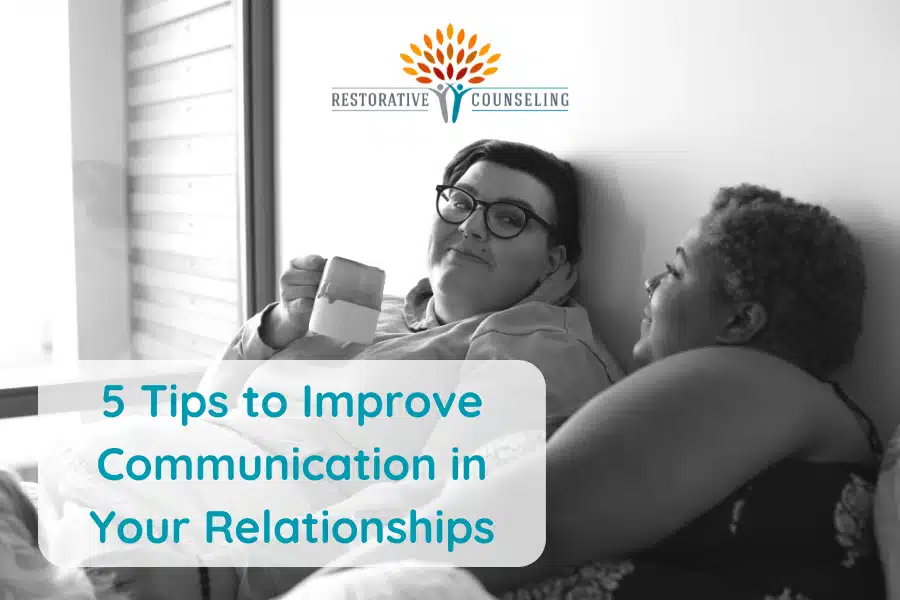Written by Jordan Meehan, LCSW
Personal relationships are complex. Every relationship involves some level of emotional, physical, verbal, and psychological connection that allows the relationship to flourish. When people become complacent, or “comfortable,” in a relationship, some of that connection can feel like it has fallen off or is no longer present. However, this does not mean that the relationship is doomed!
Communication, both verbal and nonverbal, is a significant aspect of what makes people feel connected and close in a relationship.
It is natural for the communication in relationships to ebb-and-flow. Sometimes it is very sparse and surface-level, while other times it feels very deep and meaningful. There will be times throughout a relationship when it seems as if your loved ones do not seem to understand your needs. Additionally, each of you might struggle to communicate your feelings in an easy-to-understand way. This is normal!
When feeling disconnected, you can be an active participant in improving the communication in your relationships. With a healthy dose of willingness and the right skills, you can help get the communication between you and others back to a place that feels intentional and meaningful.
Tips to Improve Communication in Your Relationships
1. Show acceptance when a need for connection is expressed.
Even if you and the other person have crazy to-do lists, your quality time is limited, or you are just tired, dedicate some of your time to those you care about if they request it. As a result, they will know that you are accepting of their need. It also shows you are willing to interact and communicate with them. This choice sends the message that your desire to feel connected to them is unconditional.
2. Ask open-ended questions to demonstrate genuine interest in what is being said.
Ensuring that your loved one senses that you are actually listening while they are talking can go a long way to improve the communication in the relationship. For example, you might say in response to something your friend said, “That’s really interesting! Tell me more about that.” Additionally, using open-ended questions shows that you are genuinely interested in what they have to say. While the topic of conversation might not be important to you, the topic is important to them.
3. Practice respect in how you listen and respond.
If your loved one is talking, allow them to finish their thought before speaking. Try not to interrupt, even if you disagree with what they have to say. Also, be sure to listen with the intention to hear what they have to say, not just with the intention to respond with your perspective on a topic.
4. Remember: improving the communication in your relationships includes body language too.
Nonverbal communication is as important as what you say when trying to connect with others. If you and your loved one are talking, be mindful of the positioning of your shoulders and the placement of your arms. People are more willing to communicate openly when they sense the other person is not in a defensive posture. For example, avoid crossing your arms or pointing your shoulders away from your friend when communicating. Try turning your shoulders towards your friend and keep your arms in a neutral position at your sides or in your lap.
5. Use “I” statements to inform your loved ones what you want, not what you don’t want.
Part of feeling connected to a loved one is understanding the needs and wants of each other. As an example, try saying something to your partner like, “I would really appreciate it if you would make dinner two nights per week since I am getting busier at work.” If conversations are focused on all the things that you don’t like or want, the chance that the other person feels and then acts defensive increases.
Meaningful and effective communication takes effort, especially if you and a loved one have gotten into a communication rut. Each person must be willing to dedicate themselves to connecting with each other, even if it means doing something that initially feels like it takes a lot of time or energy. Consider it an investment in the happiness and future of your personal relationships by incorporating these tips into your communication style.
Restorative Counseling is here to help you improve communication in your relationships
Are you finding it hard to feel connected to your loved ones? Is it difficult for you to communicate effectively in your relationships? Connection in a relationship requires time and effort. Contact Restorative Counseling to learn more about how our team can help you improve how you communicate in your relationships.

Hi, I’m Jordan!
I partner with teens and adults to treat concerns related to trauma, anxiety, and relationships utilizing CBT, ACT, and EMDR approaches. Read more about me.
Follow Restorative Counseling
Sign up for our newsletter

